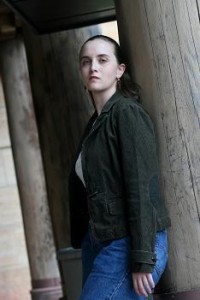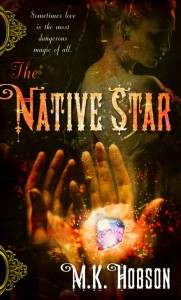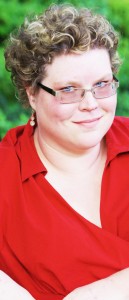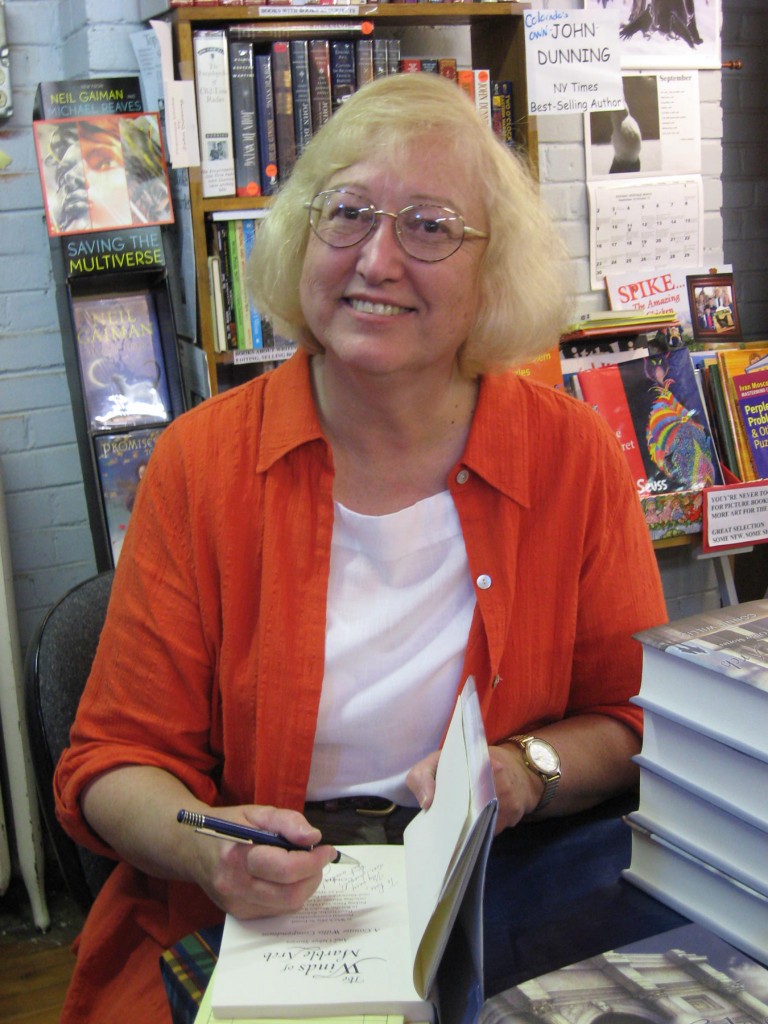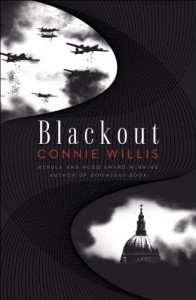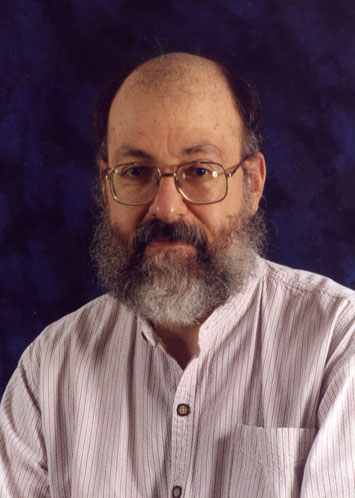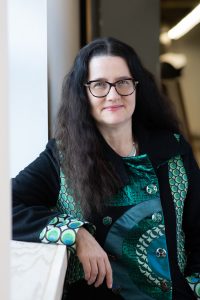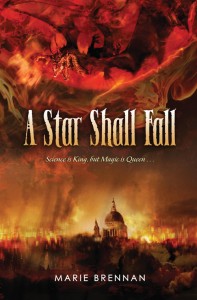 Marie Brennan is one of those people I know from the Internet, a writer I feel disposed to like well but, at the same time, someone whom I’ve never actually met in person. I first became aware of her because I’m a longtime fan of the SF Novelists blog, and her posts there on writing caught my eye. They’re accessible, smart, full of common-sense advice… and I constantly found myself sending the links to my students as optional readings. Check out this one, for example, on avoiding stereotypes with female characters.
Marie Brennan is one of those people I know from the Internet, a writer I feel disposed to like well but, at the same time, someone whom I’ve never actually met in person. I first became aware of her because I’m a longtime fan of the SF Novelists blog, and her posts there on writing caught my eye. They’re accessible, smart, full of common-sense advice… and I constantly found myself sending the links to my students as optional readings. Check out this one, for example, on avoiding stereotypes with female characters.
Marie’s novel A Star Shall Fall, whose prologue is online here,
has been waiting so patiently on my to-read pile as I’ve finished up the process of reading student submissions for my Novel Writing II class. That day is fast approaching, and I’m looking forward to it immensely. In the meantime, I asked Marie to tell us about her life and her writing journey . . .
I am a creature of sunshine and warmth; living in the Bay Area for the last two years, I’ve gotten plenty of the former but not quite enough of the latter. Until recently, I was in grad school in Indiana, studying anthropology and folklore, but my undergrad degree was in archaeology—all of which fits together pretty well for a fantasy writer. My current enterprise, the Onyx Court, I’ve nicknamed “my home Ph.D in English history;” it’s a series of historical fantasies set in London, one in each century from the Elizabethan period onward.
One of the oddities that crops up behind the scenes of a writer’s life is that when people say, “what’s your last book?” or “what’s your next book?,” your answer is frequently out of step with the reader’s perspective. To my eyes, the current project is the one I’m writing, which is the Victorian-era installment of the Onyx Court. I’ve almost got a finished draft of that, and will be turning it in to my editor by the end of the month—but readers won’t see that one until late 2011. Conversely, I’ve half-forgotten about A Star Shall Fall, which hit the shelves on August 31st and is what everybody else would think of as “current.” That’s the third book in the series, set in the eighteenth century.
Like many kids—especially those who grow up to be writers—I know I started telling stories at an early age. I grew up in Texas, and pretty much spent the entire summer in the swimming pool; I would splash around in the deep end, doing god knows what, with my brain wholly bound up in some nebulous plotless make-believe world. One summer a woman who babysat me and my brother and two other kids we were friends with taught us how to make books, binding paper into fabric and cardboard, and I wrote an utterly terrible mystery story in mine (something about a girl named Jessica whose cat was stolen). But I can point to a very precise moment when it all crystallized: I was nine or ten years old, and I’d just read Diana Wynne Jones’ novel Fire and Hemlock, which (among other things) is about a girl and her friend who collaboratively make up and write down stories about a hero and his assistant. I put that book down and thought, I want to tell a story.
I meant, by that, not just to live in the make-believe worlds inside my head, but to put them down on paper so that other people could share them. I went back to the computer (we were a technologically precocious family) and started typing up ideas about a quest for the Silversword, about which I remember nothing except I think the Silversword was actually a magical plant. In fifth grade I went to a writing workshop; in sixth I wrote a story that was way longer than the teacher wanted for a class assignment; somewhere around that same time I chose my pen name, because even at that age I knew my legal name (Neuenschwander) was far too unwieldy for commercial use. Throughout junior high and early high school I wrote stories that I would have called fanfiction if I’d known the term; they started off as me inserting my own characters into books I loved, and then once I figured out the logistical problems with that I began filing off the serial numbers and trying to make my own versions of them instead. (Which doesn’t work too well, by the way, unless what you start with bears only a passing connection to your source material anyway.)
The next sea-change came at the end of high school, when I came up with two ideas that were new. Not other people’s stories with some modifications; they were my own invention, and I could tell right away there was something different about them. They were stronger ideas, more mature. I began playing around with them in my usual way—which basically consisted of writing whatever scenes came into my head, not necessarily in any kind of connected order—and then went away to college, where I joined the SF association’s writing group, and that gave me external encouragement to produce words on a regular basis. Both of the ideas grew, until I had a largish chunk of one of them, more solid and connected than pretty much anything I’d done before. I asked the group what they thought of it, and one guy told me he liked it, but he thought the pacing was screwed-up and the characters were underdeveloped, etc.
I had one of those little brainwaves, where you look past the obvious problem to see the root cause beneath it: what I’d handed them wasn’t the beginning of the book! It was some piece out of the middle. No wonder it had those problems. So the summer after my freshman year, I sat down to write a beginning. I made a list of everything I needed to introduce or explain properly, and I came up with scenes to take care of that, and I kept going until I’d finished the list and joined my new beginning to the old piece.
And at that point, I had half a novel.
What’s more, I knew what came next, and I couldn’t wait to write it. So I had no excuse not to finish: I kept up the discipline I’d developed while putting together the beginning, writing every day, and in October of 1999, I finished my first novel.
Which isn’t Doppelganger, the first book I published (later republished as Warrior). No, that first book hasn’t sold, though it’s come so close, I want to tear my hair out. Unfortunately, it falls in this awkward crack right between YA and adult, neither fish nor fowl, and after having that book in my head for a decade and more, I just can’t re-imagine it to the extent necessary to make it be one or the other. But remember how I had two new ideas as the end of high school? Doppelganger was the other one. I wrote it in the summer of 2000, after revising and submitting the first book, and that was a pattern I kept up all through college.
By the time I graduated, I’d written five novels and had them all out in the world, making the rounds of publishers and agents. It was my way of coping with the stress and uncertainty of submission: if I had multiple books in play, all my eggs weren’t in one basket, and I had something to distract me from the months and months of waiting to hear back. (Seriously, there were occasions where an editor took so long to respond, I’d written an entire new book in the interim.) When Doppelganger had exhausted almost all of its options, with one incredibly near miss along the way, I took a long shot and sent it to Warner Aspect, where it sold in late 2004. If you want the full story on that, and what happened after, I’ve got a multi-part essay up on my site that tells all about my experiences with publishing my first novel.
From the age of ten, when I knew I wanted to be a published writer, I never had any doubt that I would make it. Which wasn’t just hubris, at least not once I grew up and learned how publishing works; so much of the game is a matter of persistence, and that’s something that was totally under my control. I could only lose if I quit, and I wasn’t going to quit, so. I was still over the moon when I finally broke through—after so many years of slamming my head against the wall, I couldn’t believe I’d actually made it!—but I never wanted to stop. If it happens that my career falters, my books don’t sell well enough and I can’t get a publisher to take me on, I’ll switch names and come back as somebody new. It’s been done before, by authors who did very well indeed the second time around. The only thing that really scares me is the possibility that publishing might collapse to such an extent that I can no longer make any kind of living at it. But even then, I won’t stop telling stories; you’ll probably find me in the thick of the crowdfunding efforts, trying to find a way to make deals directly with my fans, and publishing my novels online.
Barring that one mystery story I wrote in my cloth-and-cardboard book, and maybe something I wrote for class in second grade, my books have all been fantasy. I suppose a few of my short stories have verged over onto horror—certainly they’ve been published in horror magazines—but it’s always been speculative horror. The closest I’ve come to non-genre writing is the material I wrote for a puzzle hunt game played by Microsoft interns each summer; my brother used to be one of the game’s captains, and he hired me (like, with actual money) to write the story framework and vignettes that held the puzzles together. Those weren’t always speculative, though some of them were.
My plan, from about late high school onward, was that I would teach at a college level and write books in my spare time—a perfectly respectable path, followed by many writers before me. Most of those people, though, don’t try to start both things at the same time. I sold my first novel when I was barely two years into graduate school; it came out right when I finished my Ph.D. coursework. This falls into the odd category of “inconvenient success;” I would never say that I wish I’d had to wait longer to break in, but it messed up my academic plans more than a little, because now writing wasn’t a hobby, it was a job, and one that demanded a surprising amount of my time. I’d written novels while in school, but I’d never dealt with the necessity of copy-edits and page proofs and promotion and all the rest of the work that goes with being an author. Then I started writing the Onyx Court series, which is just about as research-intensive as academic work, and in the meantime writing was earning me more money than grad school (not that that’s hard), so when my husband’s company went bankrupt and he was out of a job, we decided it was time for a change of plans. We moved to California, he got a new job, and now I write full-time.
Which isn’t as shiny as my readers may think. I have to be very careful about my social life: my default state is not to have one. I sit at home all day, and see my husband at night, and that’s about it. So we take karate classes (at a dojo that includes my brother and his wife, who’s one of the teachers), and I run a role-playing game for some friends each week, and I do various other things to get myself out of the house, because if I don’t, my mood tanks something fierce. Like many writers, I’m an introvert, but that doesn’t mean unrelenting solitude is good for me.
I’m hoping to start writing YA alongside my adult fiction. Either way, I really want to get back to writing something in a secondary world—an invented setting, rather than historical or modern—I miss the scale of invention that you get to do when you’re making everything up. With my background in anthropology, I really enjoy putting together different societies, exploring ways of life that aren’t like what my readers are used to.
One of the pleasant surprises about publishing . . . do you know how you can tax-deduct business expenses? (In the U.S., anyway; I don’t know about other countries’ tax codes.) Well, research is a business expense. And depending on what you’re doing, “research” can be a very broad thing indeed.
When I set out to write Midnight Never Come, the first Onyx Court book, I decided that even though money was tight, I really did need to go to London. The city has changed a lot since the Elizabethan period, of course, but the streets in the City of London, the central part, are still almost identical to the medieval layout, and there were places I knew would be showing up in the book that I wanted to visit. Then, once I’d bought my flights, it occurred to me that I might as well try contacting the staff at those places, to see whether I might be able to meet with someone to ask questions, etc. So I sent out some e-mails, and got a variety of helpful responses back, and pretty soon I had a schedule for my week in London.
I didn’t realize what a fabulous scheme I’d inadvertently put together.
Take the Tower of London, for example, which shows up in the Prologue of the book. I went to the security gate and told them I had an appointment. They called up to the offices, and the woman came down to fetch me. They clipped a badge onto me and let me in—for free!—and then I proceeded to get a personalized, guided tour of the bits I’d come to see, up to and including being let into parts of the Tower that aren’t even open to the public. At Hampton Court Palace, my guide took me up onto the roof; at Hardwick Hall, I went onto the roof again, to see the “banqueting rooms” in the little towers, which again aren’t open to visitors. Throughout it all, I was in the company of people with a deep knowledge of their subjects and a wonderful eagerness to share what they knew . . .
. . . and at the end of it, I got to tax-deduct the entire trip.
There are definite downsides to writing as a career—low pay, job uncertainty, isolation, RSI—but man, it has its perks.
How it feels now is a weird combination of amazing and routine. On the one hand, selling a book to a publisher, seeing my work on the shelves—it’s this rare and magical thing that never stops being shiny. On the other hand, a lot of my friends now are writers, so selling books to publishers and so on doesn’t seem rare at all. Everybody does that, right? But you know, I get to spend my time making things up and being paid for it. This is, quite literally, my childhood make-believe turned into a legitimate career. How can that not be awesome?






